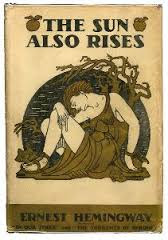'You are all a lost generation.'
Gertrude Stein in conversation
'One generation passeth away, and another generation cometh; but the earth abideth forever...The sun also ariseth, and the sun goeth down, and hasteth to the place where he arose...The wind goeth toward the south, and turneth about unto the north; it whirleth about continually, and the wind returneth again according to his circuits...All the rivers run into the sea; yet the sea is not full; unto the place from whence the rivers come, thither they return again.'
Ecclesiastes
Ever since I read
Hemingway, The Paris Years by Michael Reynolds (review
here) last year for the
Paris in July, 2014, I wanted to read
The Sun Also Rises. Finally, for
Paris in July, 2015, I have read it. It was one of his first books, and the one that made him a name. From reading the historical fiction book about Hemingway’s first wife Hadley Richardson (
The Paris Wife by Paula McLain, review
here), I remember she was upset when she read the book. It was the time when things were not going so well between them, and they divorced some time later. She read a real life crises into Jack's love for Brett.
It is partly autobiographic I would say. The main character is Jack who is living in Paris, working as a journalist for an American paper. It is hinted that he has a trauma from the years he participated in World War I. The expat community in Paris are living a frantic life, with parties and too much drinking. Jack is in love with an expat American beauty, Brett Ashley, married/divorced from a British aristocratic, and with a dark mind, that she can not control.
Jack and a friend are planning on going to Spain to do some fishing and visit the Fiesta in Pamplona, watching bull fighting. Part of his usual crowd decide to follow them there, and they decide on a date when to meet.
Here, abroad from abroad, all the tensions that already existed in Paris is coming to a peak, partly because Brett Ashley’s fiancée is joining the group. He seems a decent fellow, but changes when he has been drinking. Jack tries to stay aside and be neutral, in spite of his love for Brett, but he is inevitable being drawn into the quarrels and fights. Brett is the only woman in the group and when she falls in love with the new, young toreador, the tensions go overboard and there is no hope for the group.
The book is divided into three parts; Paris, Pamplona and Spain after the fiesta. It is beautifully told and you are easily drawn into this group of people. I have not read a lot by Hemingway, but I see I have to. Being a specialist on bull fighting and fishing, and having visited Pamplona several times himself, the descriptions of the fiesta, the town, the people, the bars and the nature are beautiful. Even the fishing and the talk between the two men is something out of the extraordinary.
 |
| Hemingway literature |
It is in a way a very sad story, a group bound for doom and nobody able to take themselves out of it. Maybe one can say that Jack, after all, was the one who saw it for what it was. At the same time, I was wondering why he did not act more determined, but just let everything roll along. Maybe this is what Hemingway himself felt in this group.
 |
At a cafe in Pamplona
(Wikipedia/John F. Kennedy Library) |
It is said that the people he wrote about, were people from the expat community in Paris at the time he was living there. Not everybody was happy about the portraits he had created. On this photograph taken during the San Fermin festival in Pamplona in 1925, are Hemingway (left), with Harold Loeb, Lady Duff Twysden (in hat), Hadley Richardson, Donald Ogden Stewart (partly hidden), and Pat Guthrie (far right). Twysden, Loeb, and Guthrie inspired the characters Brett Ashley, Robert Cohn, and Mike Campbell in
The Sun Also Rises.










What a terrific post...thanks for sharing.
ReplyDeleteAnd...thanks for stopping by my blog to wish my blog HAPPY BIRTHDAY. So nice of you.
Elizabeth
Silver's Reviews
My Blog
It is a rather compelling read, and a fascinating portrait of the age. I've always thought of it as culturally very powerful, I seem to see it's influence on succeeding generations, or maybe it has something to do with the affect of the two world wars on how people engaged with life. Every war has its lost generation. I keep meaning to read more Hemmingway, a fascinating man not always likeable but complex .
ReplyDelete